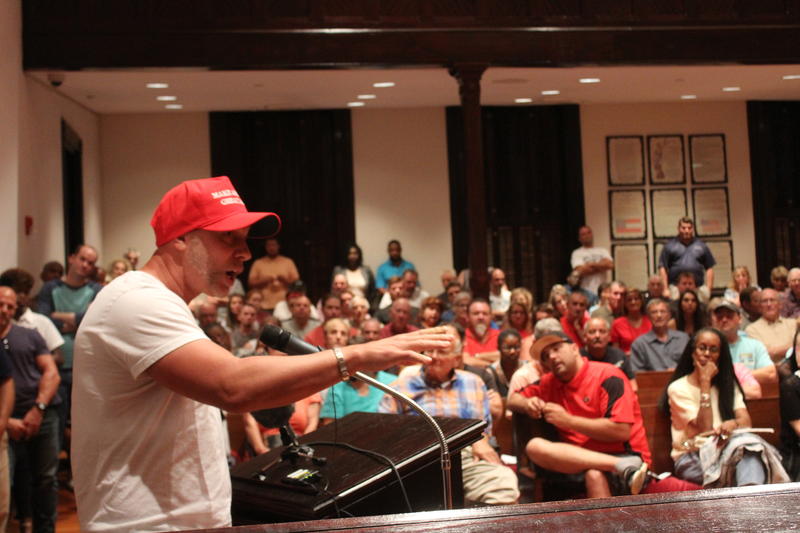In Recent Mosque Controversy, Rhetoric Echoes Presidential Race

Johnny Kauffman / WABE
In Most Recent Mosque Controversy, Rhetoric Echoes Presidential Race
A growing controversy in Newton County, 40 miles east of Atlanta, over a proposed Muslim funeral home is drawing national attention and has inspired five mayors there to call for the county commission to end its moratorium on permits for all religious buildings.
Public meetings this month have drawn crowds in the hundreds and brought out rhetoric Georgia civil rights groups call “Islamophobic.” Similar fights have taken place in recent years, but now, in Newton County, people opposed to the Muslim funeral home sound slightly different as they express their disdain for the proposal.
The most recent public meeting in the historic Covington Courthouse echoed of Donald Trump’s run for president, even as people there opposed to the Muslim funeral home denied the Republican candidate’s influence.
“I think these people would be here if Donald Trump was still running ‘The Apprentice,’” Edmond Hall said. Hall is a third-generation Newton County resident and operations manager at a business nearby.
“I am not a politician. I don’t double speak. I will tell you how I feel,” Hall said to the crowd at the meeting, “I don’t want these people and these teachings in our community. Were we not watching our TV Sept. 11, 2001?”
Hall mentioned more recent attacks like shootings in San Bernandino, California, and at a nightclub in Orlando, Florida — events Trump has seized on throughout his campaign.
But even as Hall says Trump hasn’t inspired him, he finds himself using one of Trump’s catchphrases.
“Richard Nixon coined a phrase ‘the silent majority.’ I’m here to tell you, you’re looking and listening at ‘the silent majority,’” Hall said to the crowd.
“The silent majority” appears on Trump campaign signs. It’s considered a racially loaded term by some, used to discredit liberal activists and minorities.
‘He Says Stuff Plain’
After the meeting, Joe Kirk heads to his car with a hat he says he just got in the mail that day. It says “Make America Great Again.”
For Kirk, Trump’s language is easy to connect with.
“I don’t agree with everything [Trump] says, and if anybody says they do then they’re idiots,” Kirk pauses, emphasizing his next words: “But he does say stuff plain, and he’s not beating around the bush, and you know where he’s coming from, and that’s huge.”
Trump’s clear messaging is easy to remember, and repeat. Supporters in Newton County kept using one particular word from his recent speech on immigration: “vetting.”
“This is about properly vetting them,” said Kirk after the meeting in Newton County. “And the ones that come over it’s about bringing the ones that want to abide by our laws and abide by our customs.”
Kirk has his own vetting standard: Muslims would have to publicly desecrate sections of the Quran sometimes used by radical groups to justify violence. He doesn’t expect them to do it.
‘There’s Finally Someone Who Speaks Their Language’
Megan Hollingsworth was disturbed by what most people were saying at last Monday’s meeting.
She was one of just a few people in support of the proposed Muslim worship and burial facility.
“We all have the right to worship; we all have the right to bury our dead, and I believe our Muslim brothers and sisters should have that same right,” said Hollingsworth.
Hollingsworth is Catholic and said even her family faced religious discrimination when she was growing up.
“My Catholic church had crosses burned on our lawn in Cumming, Georgia, back in the early ’80s, late ’70s, and I think it was because of a lot of situations like this. People were afraid,” she said.
But Hollingsworth said the situation is different in Cumming now. Things are better.
“I hope that Newton County will eventually become a much more welcoming community.”
Throughout the night, there was only one Muslim who got up and spoke at the meeting.
Zouhir Fakir has lived in Newton County for eight years.
He says he’s felt welcomed and was surprised by the harsh words he heard last Monday night.
“I don’t know anybody in there tonight,” Fakir said after the meeting. “These people might have been living here for years, but it’s not the majority. Living here you would think you would know people, but I haven’t recognized anybody. Which is a good thing, I guess.”
On at least one thing, Fakir agrees with many who opposed the mosque. Their rhetoric was around before Trump’s presidential run.
“He came to reflect what those people are thinking before. He’s not the one who brought this ideology. I think it’s been here for a long time,” Fakir said. “I think they’re excited that there’s finally someone who speaks their language, but I don’t think it’s something new.”
Fakir said he was nervous and mad when he got up to speak at the meeting. But he feels he’s earned the right to say what’s on his mind.
After all, he said, this is his community, too.
9(MDAxODM0MDY4MDEyMTY4NDA3MzI3YjkzMw004))








